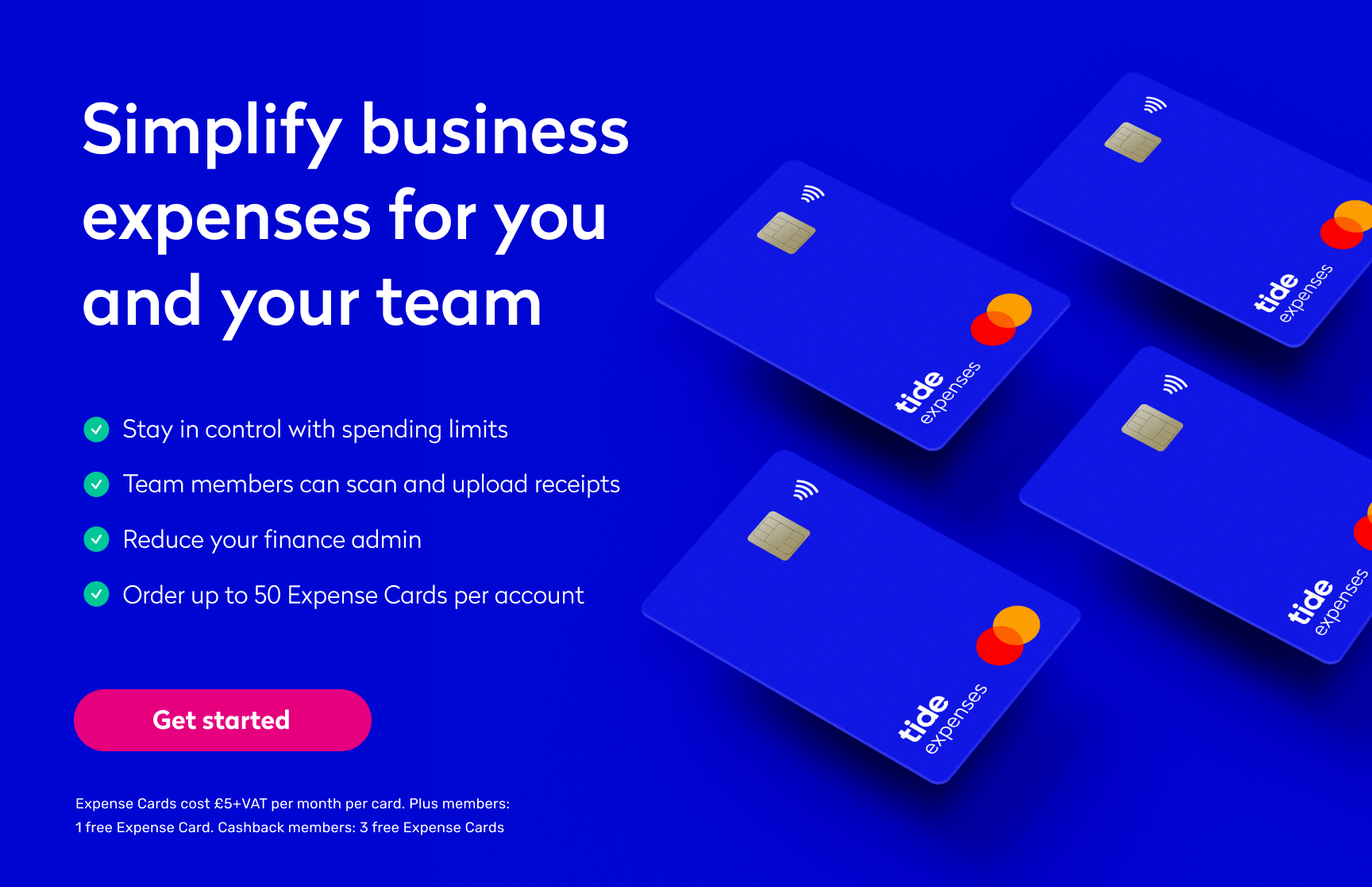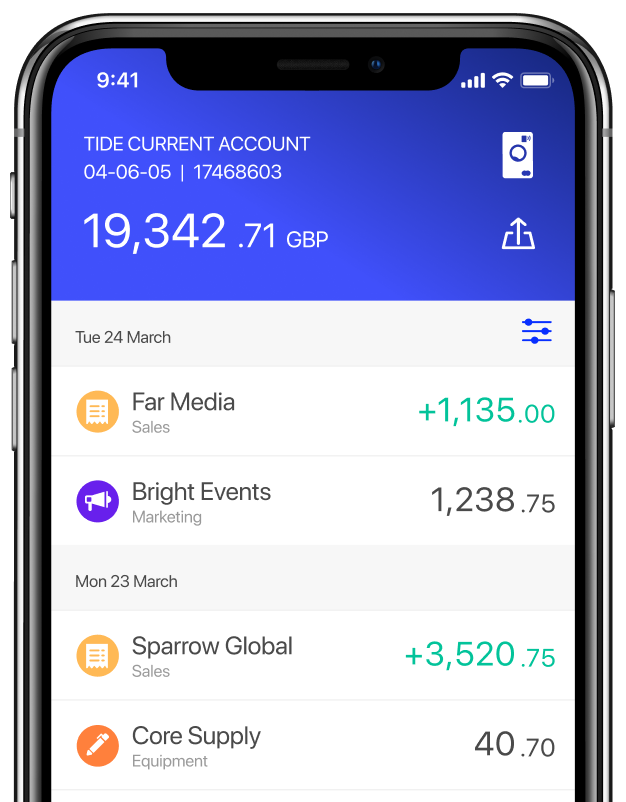
Expenses: what they are and how small businesses can manage them

Small businesses are crucial to the economy in the UK. In fact, 99.9% of the 5.7 million businesses in the UK are classified as small to medium-sized enterprises.
Unfortunately, around 50,000 SMEs fail each year due to cash flow issues. This is partly due to difficulty accessing resources, and party due to cash-flow complications.
And one of the most important parts of the cash flow equation is your expenses.
Learning how to manage expenses is crucial for a business to survive. It helps you save more money, pay the right amount of taxes, and improve the overall financial health of your business.
In this guide, you’ll find out what expenses are, which business expenses you can claim, and how exactly you can claim them.
Table of contents
- What are expenses?
- What are the different types of expenses?
- What expenses can a business claim?
- How to claim expenses
- Expert insights
- Wrapping up


What are expenses?
An expense is a cost experienced by a business to generate revenue.
Expenses include salaries given to employees, advertisement costs, tax expenses, insurance, water and electricity, stationery, fuel, and any other items, activities or assets that can be classified as necessary for running your business.
All expenses incurred by a business during a particular accounting period are treated as a cost and recorded in an income statement. An income statement is often known as the Profit & Loss, or (P&L) Statement. It’s important to have a basic understanding of the three main financial statements to help you evaluate your company’s fiscal performance.
Note: Some business expenses can be deducted from your company’s revenue before they are subject to taxes. We’ll discuss this in detail in the later sections.
Now that we know what expenses are, let’s dig deeper into the different types of expenses that a business can incur.
What are the different types of expenses?
There are three major types of business expenses:
- Operating expenses
- Non-operating expenses
- Capital expenses
Let’s look at each one of them in detail.
1. Operating expenses
These are the expenses incurred by a business in its day-to-day operations.
Operating expenses are short-term, recurring costs that are often paid off within the same accounting period that they are incurred in. An accounting period is usually the same length as your business’s financial year.
Operating Expenses (OPEX) are divided into two parts:
- Selling, General, and Administrative Expense (SG&A)
- Cost of sales
SG&A expenses encompass everything that is not directly related to the costs of producing the items that your business sells. Examples of SG&A expenses are paying rent or utility bills.
Cost of sales, on the other hand, are directly related to the cost of producing a company’s goods or services. For example, the materials your business uses to sell coffee, like cups or lids, would be calculated as part of your cost of sales.
Operating expenses and cost of sales are both included in the income or P&L statement, but are displayed as separate line items.
Let’s look at each type of operating expense in detail.
OPEX under SG&A expenses
Operating expenses under SG&A (Selling, General, and Administrative Expense) are normally associated with a company’s overheads.
Here are some operating expenses that fall under SG&A:
1. Utility expenses
These are expenses related to paying your utility bills.
Utility expenses include water, gas, and electricity that is consumed by your business on a daily basis.
2. Office supplies expenses
These expenses are incurred for the purpose of purchasing office supplies, such as stationery, tables, chairs, and printing supplies.
3. Telephone expenses
These are costs your business incurs when using either landline or mobile phones. These expenses are usually paid at the end of each month.
4. Travelling expenses
These include costs incurred by yourself or your staff when travelling for official visits, meetings, and related purposes.
These expenses may be infrequent, but when they do occur, they must be recorded in the income statement as traveling expenses.
5. Legal expenses
These are expenses incurred for using any kind of legal services.
6. Insurance expenses
These are expenses for purchasing general insurance, healthcare insurance, or fire insurance for your employees.
7. Advertising expenses
These are related to the promotion and advertising of your brand or your brand’s products.
Advertising expenses are part of OPEX (Operating Expenses) because they are incurred with the intention to increase sales or generate more revenue.
8. Bank charges
These expenses include fees or any other amount a bank may charge for transactions carried out by your business. For example, charges applicable to cheque processing.
OPEX under cost of sales
Operating expenses under cost of sales include all costs directly associated with the production of goods or services sold by your business during a specific time period.
Here are some operating expenses that fall under cost of sales:
1. Freight-in costs
This is the shipping cost that has to be paid by the buyer upon purchase of merchandise. Any expenses related to freight-in are considered as part of the cost of merchandise.
In case the merchandise has not yet been sold, then the same should be considered as part of the inventory.
2. Freight-out costs
This includes the transportation cost of merchandise. It is associated with the delivery of goods from the supplier to the customer.
3. Rental costs
This is the cost incurred for the use of rented property or machinery that provides support to production-related functions and operations.
4. Product costs
This is the cost incurred to make a single unit of a product to be sold to customers. This includes costs related to direct labor, direct overheads, and direct material.
5. Depreciation expenses
Depreciation is the reduction in the value of an asset due to wear and tear.
This may or may not be applicable depending on certain items used at the time of production.
2. Non-operating expenses
These are expenses incurred by your company that do not relate to the core operations of your business.
On the income statement, non-operating expenses are displayed after operating expenses and are deducted from the operating profit.
Here are some examples of non-operating expenses incurred by a business.
1. Interest expenses
The interest expense is the cost of borrowing money. It is the amount charged by a lender to a business for using the lender’s money.
This type of expense could include the cost of bank loans, bonds, convertible debt, and borrowed money from other sources.
2. Loss on disposal of assets
This type of expense is incurred when your business eliminates an asset from its accounting records.
The gain or loss that occurs upon disposal of an asset is calculated as the net disposal proceeds, minus the asset’s carrying value.
3. Obsolete inventory charges
These expenses refer to the inventory that’s at the end of its product life cycle. This inventory has not been sold, or has been unused for a long period of time, and is not expected to be sold in the near future.
This type of inventory can cause large losses for a company as its essentially dead weight.
4. Lawsuit settlement expenses
These are expenses involved in settling lawsuits.
Since these are not directly tied to the core operations of a company, they fall under the non-operating expenses category.
5. Restructuring expenses
This is the cost incurred due to reorganising business operations to improve overall efficiency and long-term profit.
Top Tip: Both operating and non-operating expense categories are generally recorded on an accrual basis. Accrual basis is a method of recording accounting transactions where expenses are matched with the revenues reported for a particular accounting period, and not with the period during which you actually pay for these expenses. Learn more about accounting fundamentals in our accounting for startups guide.
3. Capital expense
Capital expense (CAPEX) is the money spent by a company to maintain or improve its fixed assets.
Purchasing new machinery, vehicles, buildings, land, or any other major asset of a company is part of the CAPEX.
CAPEX includes the following:
- Buildings
- Computer equipment
- Office equipment
- Furniture and fixtures
- Land
- Machinery
- Vehicle
- Software
Expenses are also categorized in terms of their usage, which may either be fixed or variable.
Fixed expenses are payments that businesses have little control over as they represent a legal obligation to pay, such as your rent or mortgage.
Variable expenses are payments that businesses have full control over. This type of expense varies as a business chooses to decrease or increase its production or any other activity. Transaction fees and commissions are included in variable expenses.
What expenses can a business claim?
Claiming expenses can be good for your business.
That’s because most business expenses are deducted from your income before they’re subject to VAT and other taxes.
This is also called a tax relief, in which allowable business expenses reduce the amount of tax to be paid by a company.
To claim your business expenses, you need to keep an accurate and auditable record of everything, for up to six years.
Here are some expenses that can be claimed by a business:
- Staff costs: Salaries, wages, bonuses, pensions, commissions and other types of compensation offered to full-time employees, independent contractors, consultants, and freelancers are tax-deductible expenses.
- Office costs: Office expenses, such as rent, utilities, phone bills, supplies, and other items used for less than two years can be claimed as a business expense.
- Travel costs: Some transportation costs, such as fuel, parking, train, or bus tickets, are tax-deductible. Travel to and from the workplace is not tax-deductible.
- Clothing expense: Money spent on clothing that’s required to do business, such as uniforms and safety gear, can be claimed as a business expense.
- Raw materials: Things you buy to sell on, such as stock or raw materials, are tax-deductible.
- Training courses: The cost of training your employees or offering courses that are related to your business can be claimed as an expense.
- Marketing and advertising: This includes website domain registration, hosting fees, photographs, brochures, flyers, and other advertising and marketing expenses.
- Insurance: Financial costs, such as insurance or bank charges, are tax-deductible.
- Food expense: Official meals with clients or employee lunches during official business travel are deductible at 50%.
- Entertainment costs: HMRC allows you to claim £150 a year per employee for entertainment purposes, but there’s no allowable expense claim if you’re a sole trader.
The expenses you can claim also depend on the type of business you’re running. For example, if you’re a sole trader, your list of tax-deductible expenses might be different from that of a limited company.
Note: In the 2021-2022 tax year, Personal Allowance in the UK is £12,570. This means that you can offset up to this amount to lower your tax payments.
On the other hand, there are some expenses that are not tax-deductible.
Here are some examples of expenses that a business cannot claim:
Penalties: Failure to file taxes at the right time, or not being able to make bill payments on the due date, can lead to penalties that can’t be claimed as a business expense.
Political contributions: If, in any case, your business has made contributions to a political party, you can’t deduct these contributions.
Hobby related expenses: Personal hobbies are not allowable business expenses.
How to claim expenses
Before you can claim an expense, you need to make sure that you have an accurate and auditable record of it.
This works as proof that these costs were actually incurred during a specific time period and are therefore eligible to be claimed.
The next step is to add up all allowable expenses for the tax year and put the total amount on your Self Assessment tax return—a system that HMRC uses to collect Income Tax.
You don’t need to share any proof with HMRC until you’re specifically asked to do so. This is why it is advisable to keep an accurate record while submitting your tax returns.
Note: The deadline to file a Self Assessment tax return is January 31st for online filing.
💡 Expert insights
Insights author: Sally Percy is a business and finance journalist, editor and commentator covering the business, finance, banking, treasury and accountancy sectors.
What do business owners often overlook when managing their expenses?
I think the main thing that business owners tend to overlook are the small items they pay for with cash or a debit card, out of their own pocket – things like taxi fares, sandwiches or coffees when travelling, even newspapers and other publications.
Because these expenses are for small amounts, business owners often don’t bother reclaiming them through their businesses. These small amounts can add up to a large amount over time, however. So it’s really important that business owners claim for all their genuine business expenses, no matter how small they are.


Wrapping up
Managing your expenses properly can bring you both short- and long-term benefits.
In the short term, you get to pay less tax and save money.
In the long term, this means you can invest more in your business and improve its overall financial health.
Photo published on Pexels




